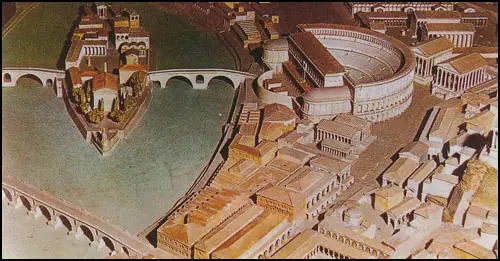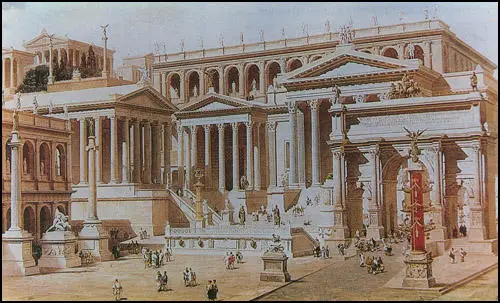Ancient Rome
From the earliest days of Rome, the Forum was the most important part of the city. It was here the politicians met to decide on the future of the Roman Empire, where judges and lawyers administered the law, and where traders sold their goods in the large market. The Forum was also the place where emperors ordered the large, elaborate temples to be built.
The area became so busy that a law was passed that banned wheeled vehicles in the Forum between sunrise and four in the afternoon. Later, the market was moved from the Forum in an attempt to reduce the congestion in the area. Martial complained about the growth in shops: "Shopkeepers had swallowed the whole of Rome... (now) people are no longer forced to walk in the mud... The barber, the cook and the butcher have to keep behind their thresholds. We have Rome again, where yesterday there was nothing but one great filthy shop."

Juvenal was more concerned about the noise and traffic: "The movement of heavy wagons through narrow streets, the oaths of cattle-drovers would break the sleep of a deaf man... we are pressed by a huge mob shoving... now we are smashed by a beam, now biffed by a barrel. Our legs are thick with mud, our feet are crushed by a soldier's hobnail boot... Newly mended shirts are torn again... a wagon carries a long pine; they swing and threaten you."
By the 1st century AD the population of Rome had grown to a million people. Short of space, the Romans were forced to build upwards. The vast majority of Romans now had to live in blocks of flats called insulas. At first these buildings could only be 20 metres high but, as the demand for housing increased, the government allowed them to go even higher (six or seven floors high).
Streets were also kept very narrow to save space. They were often crowded and several Roman writers complained about the constant pushing and shoving that went on. It was also very noisy. Traders shouting out details of the goods they had for sale were responsible for a lot of this noise.
People came to Rome from all over the empire in an attempt to make their fortune. The streets were packed with people trying to sell their goods. There were also snake-charmers, sword-swallowers, and men performing tricks with dangerous animals, all begging from the crowds who stopped to watch them.
Some of the people who came to Rome turned to crime. Gangs of robbers were a constant problem and few people would go into certain areas after dark. Those who did have to leave their homes at night would take slaves with them to carry torches and to guard them against attacks from criminals.
Groups of soldiers wandering the streets could also be a problem. They developed a game called sagatio. After getting hold of an innocent passer-by they would put him into a large blanket and throw him in the air. The police who patrolled the streets and who were supposed to protect the local citizens tended to ignore the actions of soldiers.

As with most big cities, the rich and the poor lived in different areas. Most of the wealthy people lived on the Aventine or the Saepta. To serve their needs, shops selling luxury goods were opened there. On the other hand, areas by the banks of the River Tiber and by the outside walls were mainly inhabited by the poor.
After the great fire of AD 64, large parts of Rome were rebuilt. Emperor Nero, in an effort to stop fires spreading so fast, ordered that in future the streets should not be so narrow. However, the people argued that the wider streets exposed them to the glare of the sun.
By the 5th century Rome had grown to a circumference of twelve miles. People complained about the loss of greenery in Rome. Several politicians, starting with Julius Caesar, left their large gardens to the people of Rome.
Although the Romans had a sewage system the vast amount of their waste went into the River Tiber. This was not only unhealthy but created unpleasant smells, especially in the summer. Some Romans wore a garland of roses round their necks to cover up these smells. Wealthy women carried a small ball of amber. When rubbed it gave off a pleasant fragrance.
Primary Sources
(1) Aristides, Rome (c. AD 145)
So many merchant men arrive here (Rome) with cargoes from every where... and the city seems like a common warehouse of the world. Cargoes come from Egypt, Sicily, Africa, India, Arabia, clothing from Babylonia and luxuries from the barbarian lands beyond... The arrival and departure of ships never ceases.
(2) Roman Law passed by Emperor Domitian (c. AD 85)
Let no one be found to have had a dog, pig, hog, boar, wolf, bear, panther or lion in any place where the public normally walk... If this law is broken and a free man has died in consequence let the guilty one be condemned to pay 200 solidi.
(3) Martial, Epigram VII (c. AD 90)
Shopkeepers had swallowed the whole of Rome... (now) people are no longer forced to walk in the mud... The barber, the cook and the butcher have to keep behind their thresholds. We have Rome again, where yesterday there was nothing but one great filthy shop.
(4) Juvenal, Satire III (c. AD 110)
The movement of heavy wagons through narrow streets, the oaths of cattle-drovers would break the sleep of a deaf man... we are pressed by a huge mob shoving... now we are smashed by a beam, now biffed by a barrel. Our legs are thick with mud, our feet are crushed by a soldier's hobnail boot... Newly mended shirts are torn again... a wagon carries a long pine; they swing and threaten you... If you can tear yourself away from the games in the Circus you can buy an excellent house at Sora for what you now pay in rent for a dingy garret in Rome in one year.
1. How do these sources help to explain why Rome was overcrowded?
2. Were the changes to the size of Rome rapid or gradual? Do you think all Romans would have welcomed this increase in size?
3. What problems would a historian have in finding sources that opposed the law (source 2) passed by Domitian? How might this influence .a historian's interpretation of the way Romans responded to this law?
